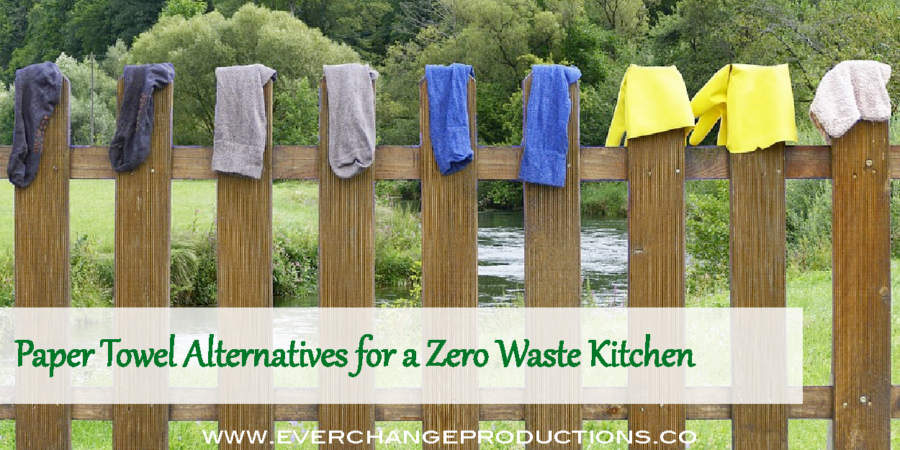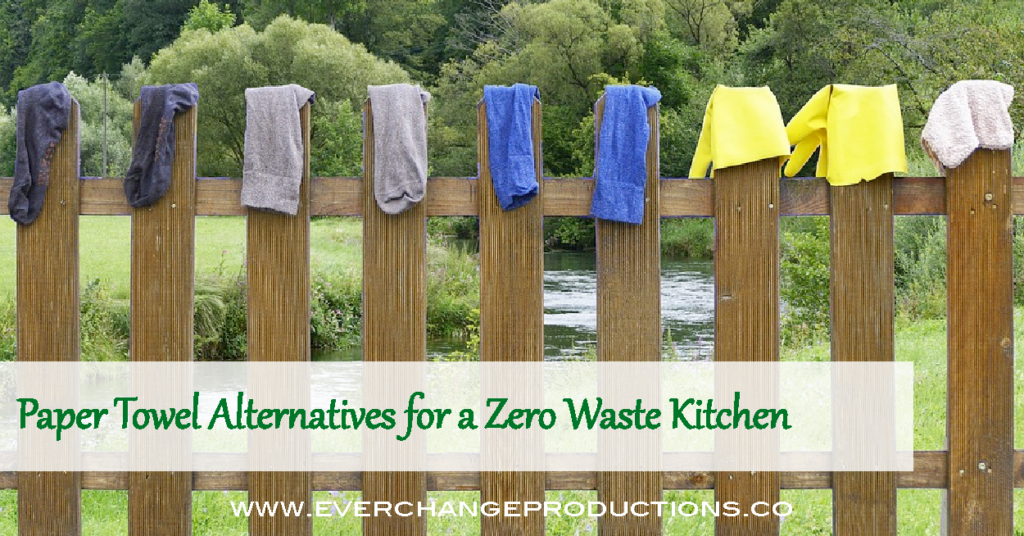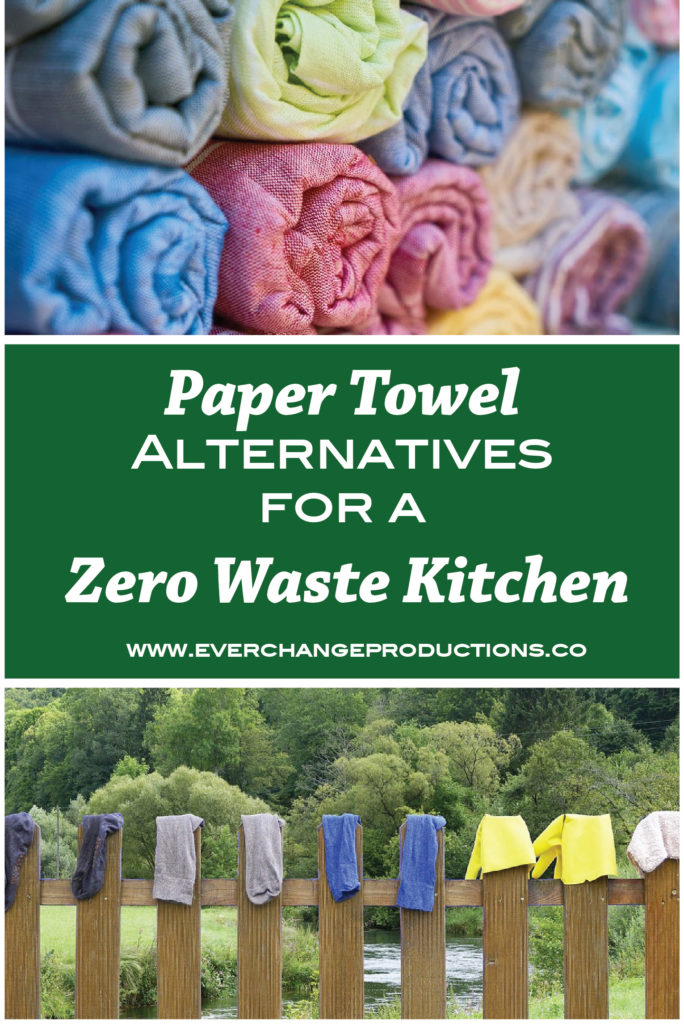Ditching Paper Towels
Zero waste kitchen towels are an essential for any zero waste kitchen and sustainable apartment living lifestyle. Switching from paper towels is one of the easier switches to make because there is common replacements, that actually clean better and will save you money, while keeping unnecessary waste from the landfills.
I didn’t grow up in a heavy using paper towel household. We mostly used rags and dish towels without a second thought. But the other day, I was talking to my friend who was trying to reduce her waste and not using paper towels seemed like a real struggle. So, I did some research and turns out others struggle with it too.
This post contains affiliate links
While there are some benefits to using paper towels, it still seems like throwing your money away, with some wood pulp and water. Paper towels can’t be recycled, about 6 million pounds of paper towels end up in landfills each year. Paper towel production also requires an estimated 110 million trees and 130 billion gallons of water.
Unless it’s something smelly or gross that I can’t throw in the laundry right away, rags or dish towels are always my go-to answer for cleaning up messes. However, some people do feel like they are a cornerstone of the kitchen, but using a paper towel alternative is much better for the environment and our pocketbook.
If you want to switch to an eco-friendly lifestyle and save money, use an paper towel alternative instead. During my time researching paper towel alternatives, I found a variety of options, but the problem is that even if they reduce paper usage, they’re not necessarily environmentally friendly overall.
Zero Waste Cleaning
The first paper towel alternative I found was microfiber? While microfiber tends to have great absorbancy, it’s actually made from plastic. It’s best to stay away from that option. If you haven’t had a chance, check out microplastics. While microplastics go unnoticed by nearly everyone, they’re causing some the biggest problems in our food supply, oceans, and land. This is certainly not a zero waste swap I recommend.
Swedish Dishcloth
After this post was originally published, the outreach manager at Swedish Wholesale contacted me about doing a review of their Swedish dishcloths. I’m always interested in finding new sustainable products, so I jumped at the chance to check out these paper towel alternatives! Unlike unpaper towels, which I go over below, I feel the Swedish dishcloth is a much better value.
Environmental Impact
My favorite aspect of the Swedish Dishcloth is they’re made from 70 percent biodegradable cellulose and 30 percent all natural cotton materials. This means they’re not only more absorbent than a traditional cotton dishcloth, but they’re going to last longer too!
Cost Factors
Those that use a lot more paper towels than I do, say that consistently using even ONE Swedish dishcloth will replace up to 15 rolls of paper towels. A 8-pack of paper towels costs about $19 here, compared to a pack of TEN Swedish dishclothes that are basically the same price. Talk about a win-win for the environment and your home.
The best part is when you’re done with the Swedish dishcloth, you can throw it in the compost or cover it with dirt and it’ll compost in about 8 weeks.
Easy to Wash and Sanitize
Not only are they more hygienic than sponges and rags because they dry quickly, giving bacteria less time to grow, but they’re also washing machine safe. You can use them over and over again and when they need a cleaning, just throw them in the washing machine, so you can use them some more.
Ultra-Absorbent
In addition to reusable factors, there are other factors to consider. For instance, absorbance. These suckers will soak up just about any spill and hold up 20 times their weight. We don’t have soda in the house, but next time we across some, I’m going to spill it and get back to you on well it works. But for any other liquid, it worked super well.
Swedish Dishcloth vs. Paper towels
Swedish dishcloths are similar to paper towels in that they can be used to clean kitchen countertops, sinks, dishes, stainless steel appliances, glass, and more.
But there’s even things you can do with with a Swedish dishcloth, that paper towels can’t do, such as scrubbing stains out of carpet. I don’t recommend doing this often, but it’s good to know in a pinch.
Swedish Dishcloth Conclusion
I’ve learned most of this information just using a Swedish dishcloth this past weekend. The benefits are obvious. Before trying Swedish dishcloth, cotton napkins were my paper towel alternative, mostly because of the cost. But the absorbent factor and hygiene factors, along with the biodegradable nature make Swedish dishcloth my new favorite! I hope to update with you more observations regarding durability and other time related factors. In the mean time, check out how Swedish dishcloths compare with other eco-friendly kitchen scrubbers!
Unpaper Towels
My problem with unpaper towels is that they’re unnecessary and expensive, but they’re all the rage in zero waste circles, so I’ll let you decide. My main issue is that it depends on the mentality that you have to go out and buy something new or costly to reduce waste, and that simply isn’t true. Unpaper towels require additional energy, water, and money.
I will say they have cute prints, and snap together so they can go on a roll similar to paper towels, which is cool. But it’s about $40 for a pack of 16, instead of $1.50 for 5 cotton napkins and for me personally, it’s just not worth it.
DIY Reusable Paper Towels
The good news is that you also feed like $40 is just too much, you can also make your own reusable “paper towels“. You can use leftover scraps from other projects and probable even repurpose the materials from flannel clothes, blankets, etc you have from around the house.
Cotton Napkins and Dish Towels
Cotton Napkins are a great zero waste cleaning tool. It’s more absorbent than paper towels, fairly cheap to buy, is durable and it doesn’t leach tiny plastic particles into our water ways. Sounds like a win-win. It does take a bit of water to make these, and the cotton industry does use a fair amount of pesticides, but you can always repurpose cloth from around the house for most cleaning situations or buy organic cotton, which is a bit more expensive but still more cost effective than other options.
How to Clean Without Paper Towels
So if it seems like a daunting task to live without paper towels, here are some of the tips I’ve learned along the way.
Color-Coded Rags
Using the same rags to clean the bathroom, clean cat vomit, or use in the kitchen just seems unsanitary. Rightly so, but keep certain towels or rags for cleaning specific rooms. Try color-coding them so you know which towels to use for which rooms.
Separate Towels for Separate Tasks
In your kitchen, store towels for drying dishes and towels for drying your hands separately. This will reduce risk of swapping nasty germs by using the same towels for these activities.
Reuse Cloth
One of the biggest issues I see in the zero waste community is promoting a need to buy something new that supposedly will reduce waste. Sometimes this is necessary, but sometimes it’s best to reuse what we already have. For down and dirty cleaning, use rags made from old T-shirts, bath towels or any other scrap cloth you have on hand. This will make sure we make the most of it’s life before we toss it when it’s too dirty or worn.
For light dusting try using old socks or socks without a proper mate. Pull the socks onto your hands like mittens and dust away.
Challenge Yourself
Make the cut all at once, you’d be surprised on how easy it is to use a paper towel alternative. Once you’ve trained yourself to live without paper towels, you can use up the paper towels more slowly over time until you run out.
Don’t forget to pin this information for later!


